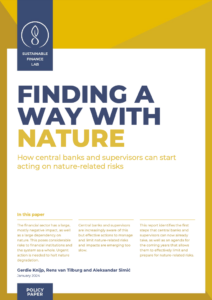The financial sector has a major impact and dependence on nature. Nature is degrading at a rapid rate. This poses significant risks for financial institutions individually, but also for the financial system as a whole. In a new policy paper we discuss what role central banks and supervisors can play.
Financial institutions and the financial system as a whole are faced with nature-related physical and transition risks, and are at the same time contributing to further degradation of nature. There is an important role for the financial sector to align financial flows with the conservation and restoration of biodiversity.
Central banks and regulators are increasingly committed to the topic of climate change, as well as nature. In the field of climate change, for example, more measures are being taken for financial institutions that do not sufficiently take the climate change into account. While in the past these measures often only had a warning and non-binding character, the ECB have now announced fines. While nature is also increasingly on the radar of central banks and supervisors, this has not yet led to concrete action.
Given the accelerated decline of nature, rapid action is now needed. We formulate four guiding principles:
- Take an integrated approach to climate change and nature loss;
- Recognise not only the risks that financial institutions are exposed to, but also the risks they create (endogenous risks);
- Take a precautionary principle;
- Focus on the most harmful practices: deforestation, pesticides, mining activities in biodiversity-sensitive areas, intensive agriculture and fossil fuels.
We outline a concrete agenda for the short and medium term. In the coming years, central banks and supervisors can test knowledge on nature and biodiversity when assessing directors and senior staff via the so-called fit and proper test. They can share best practices, for example on the integration of nature in climate transition plans. Over the horizon of two to three years, such integrated transition plans could be made mandatory with the addition of fines and higher capital requirements if the plans do not meet sufficient demands. Nature should become equally important in monetary policy as climate change.
The full paper can be downloaded below.



